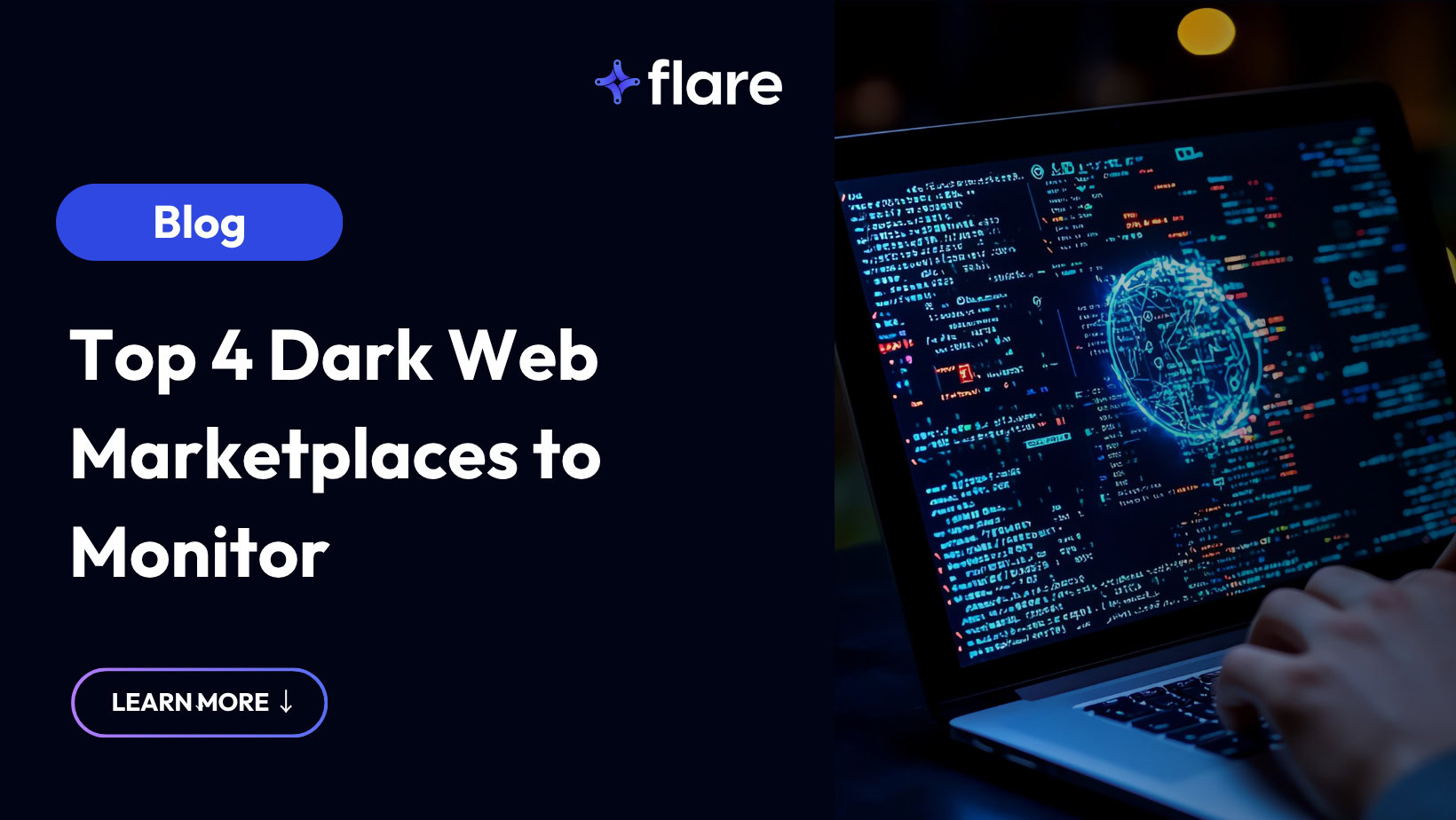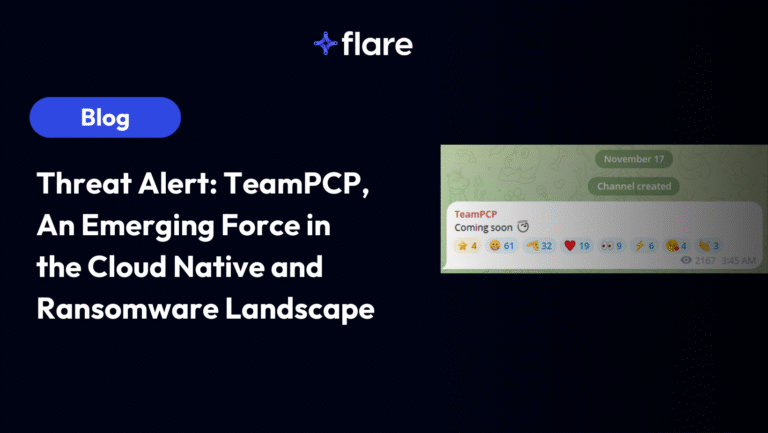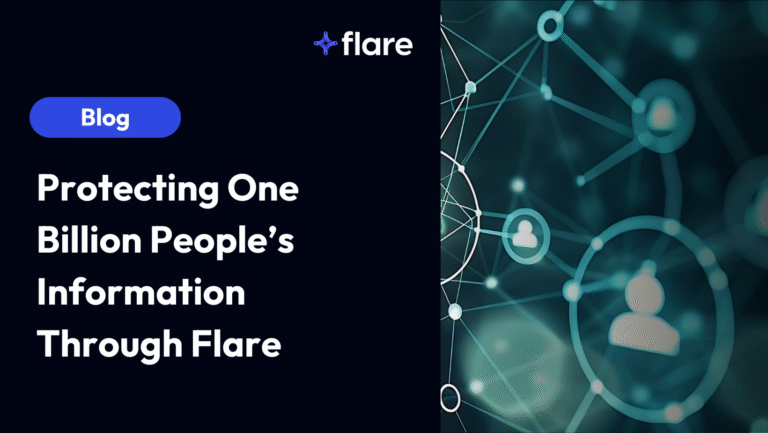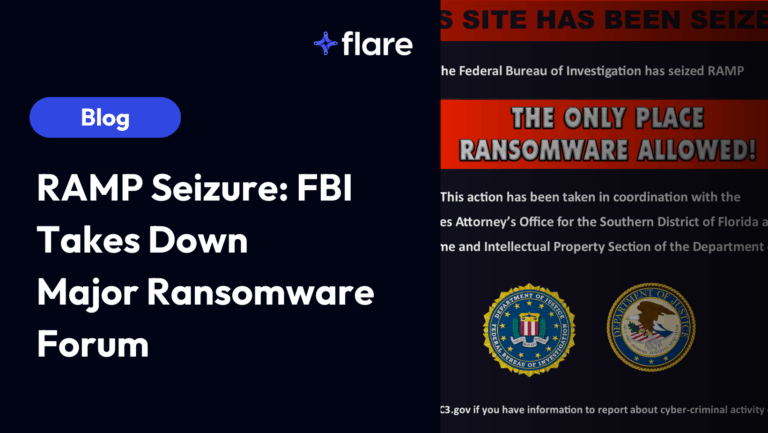
This article was updated on November 4th, 2025.
The ever-changing nature of dark web marketplaces makes it vital to stay on top of the main sites worth monitoring. High-profile markets sometimes close overnight, and new markets can surge in popularity quickly.
We’ve put together the top dark web marketplaces worth monitoring for potential threats.
Know When Your Data Appears on Dark Web Markets
Flare continuously monitors dark web marketplaces, forums, and ransomware leak sites. Get alerted when threat actors trade credentials, corporate data, or access to your organization.
Why Dark Web Marketplaces are Especially Important to Monitor
Dark web marketplaces have matured significantly over the past five years. What were once unreliable forums with frequent exit scams have evolved into sophisticated commercial platforms with escrow systems, vendor ratings, dispute resolution, and customer support. This professionalization has made them more accessible to a broader range of threat actors, not just technically sophisticated criminals.
Three trends make marketplace monitoring more critical than ever:
First, the explosion of infostealer malware has created a steady supply of fresh credentials and session cookies flowing into these markets daily. Threat actors no longer need to breach an organization directly. They can simply purchase valid credentials from a marketplace vendor who aggregates stealer logs from thousands of infected devices. Take Russian Market as an example of high-risk marketplace for enterprise security teams. Russian Market acts as a broker, connecting sellers of stolen data to buyers.
Second, initial access brokers have established marketplaces as their primary sales channel. These specialists compromise corporate networks and then sell that access to ransomware operators, data thieves, or espionage groups. A listing for VPN credentials or RDP access to your organization can appear on a marketplace days or weeks before an actual attack occurs. Monitoring for these listings provides a rare opportunity to detect and respond to a breach before the real damage happens.
Third, the ransomware economy has created a robust market for corporate data. Even organizations that refuse to pay ransoms often find their exfiltrated data sold piecemeal on marketplaces: customer databases, financial records, intellectual property, and internal communications all command prices based on their sensitivity and exploitability.
How Do Dark Web Marketplaces Work?
Dark web marketplaces are commercial platforms hosted on Tor hidden services that facilitate the buying and selling of illicit goods and data. They operate similarly to legitimate e-commerce sites, with product listings, shopping carts, vendor profiles, and review systems. The key differences are the goods being sold, the payment methods accepted, and the infrastructure required to access them.
Buyers and sellers connect through the Tor network, which routes traffic through multiple encrypted relays to obscure IP addresses. Transactions are conducted in cryptocurrency, typically Bitcoin or Monero, with funds held in escrow by the marketplace until the buyer confirms receipt. This escrow system reduces fraud risk for both parties and has been essential to building trust in an environment where participants are anonymous and legal recourse is nonexistent.
How Dark Web Marketplaces Work
Dark web marketplaces operate like illicit e-commerce platforms—complete with vendor ratings, escrow systems, and customer support.
Anatomy of a Transaction
How cryptocurrency and escrow enable anonymous commerce
The Marketplace Ecosystem
Trust Without Identity
What’s Being Sold
The Speed of the Underground
Stolen credentials can appear on automated marketplaces within hours of initial compromise. Without continuous monitoring, security teams are always reacting to breaches that threat actors discovered first.
Vendors build reputations through completed sales and buyer reviews. Established vendors with hundreds of positive reviews can charge premium prices and attract more customers. New vendors often offer discounts or samples to build their reputation. Some marketplaces require vendors to post a bond that is forfeited if they engage in fraudulent behavior.
Listings relevant to enterprise security typically fall into several categories:
Credentials and access: Stolen usernames and passwords, session cookies, VPN and RDP access, cloud console credentials, and API keys. Prices vary based on the target organization’s size, industry, and the level of access provided.
Corporate data: Databases exfiltrated from breaches, internal documents, customer records, financial information, and intellectual property. Data is often sold in bulk or as exclusive listings.
Fullz and identity packages: Complete identity profiles including names, addresses, Social Security numbers, bank account details, and answers to common security questions. These enable account takeover and fraud.
Tools and services: Malware, exploit kits, phishing kits, and hacking services. Some vendors offer “access as a service” where they maintain persistent access to compromised networks and sell it repeatedly to different buyers.
What is the Current State of Dark Web Marketplaces?
Recent trends show a large downturn in estimated revenue generated by dark web marketplaces. Research conducted by blockchain analysis company Chainalysis noted a decline in revenue from $3.1 billion in 2021 to just over $2 billion in 2024.
Years-long international law enforcement operations have taken down many dark web marketplaces. The biggest hit was the shutdown of the popular Russian-language Hydra Market in 2022. The market generated up to $1 billion in revenue.
Since Hydra Market closed, several other dark web marketplaces have tried to take its place as the top dark web market. Law enforcement continues to work to shut down these cybercrime communities. They saw success with the closure of Genesis Market in 2023 and BidenCash in 2025.
However it’s worth noting that even if law enforcement takes down the infrastructure of a market, it may pop up elsewhere. For example, Genesis Market was officially taken down, but the website was operational again a few weeks later. Even if law enforcement arrests the administrators of dark web markets or takes down the infrastructure, if the code to the infrastructure is still available to somebody else, the infrastructure can be put back online on another server with new administration (or remade from scratch with the same branding). With that said, after a successful law enforcement takedown, threat actors lose a lot of trust in that market.
Are Dark Web Marketplaces Still Relevant?
The emergence of Telegram as a new dark web frontier also partly explains the revenue reductions in traditional dark web marketplaces. Threat actors and aspiring cybercriminals have been flocking to Telegram channels and groups hoping to benefit from anonymous profiles and end-to-end encryption. Telegram supplements the activities on dark web markets, and the dark web remains a popular choice for anonymously trading in illicit goods, malware, and stolen data. Darknet markets still made $2 billion in 2024 even with increased law enforcement pressure. As long as the dark web exists, marketplaces will continue to emerge and flourish.
Four Dark Web Marketplaces to Monitor
Many dark web marketplaces focus on the trade of illegal and prescription drugs along with counterfeit and pirated goods/services.
But other dark web marketplaces only offer services that could help threat actors get into an organization’s network. Threat actors can find malware, ransomware, stolen credentials, hacking tools, and other services for sale.
Here are the top four dark web marketplaces worth keeping an eye on:
1. Abacus Market
Abacus Market is an English-language hub for various illegal activities. It offers a variety of illicit products and services ranging from drugs to phishing kits. In terms of cybercrime, there are thousands of listings for stolen data, hacking tools, and financial scam tools. The overall value is estimated at $15 million.
Abacus Market offers a vendor verification system, and buyers can leave reviews about sellers. It’s supposed to help establish credibility within the shady world of cybercrime. The platform also uses 2FA, phishing warnings, and bug bounty programs to establish security around its services.
2. Deepmix
Deepmix is a Chinese-language market (currently in a rivalry with the market Chang’an). It was established in 2013 and is perceived as a more reliable market, as it has been around for about 12 years. This was originally a forum, but shifted into a marketplace after users demanded Bitcoin payment options.
As English-speaking markets get shut down, it’s possible that non-Chinese speaking threat actors may try to move towards this platform.
3. BriansClub
BriansClub focuses on credit card fraud and personal identity information. It’s one of the largest dark web marketplaces, but you can also find it on the clear web. Besides comprehensive credit card information, the platform also sells data like Social Security numbers and birth dates.
In 2019, law enforcement came down on BriansClub. Investigators discovered that the platform made over $126 million. Despite the legal interference, BriansClub still exists and continues to market credit card data and other sensitive information.
4. Russian Market
Russian Market has high volumes of stolen information available. Registration is easy and the site is accessible via both the dark web and clear web. Newly registered users need to deposit at least $50 worth of cryptocurrency to view listings.
Russian Market
One of the largest automated dark web marketplaces for stolen credentials, credit cards, and infostealer logs—operating continuously since 2019.
From Infection to Marketplace
Why This Matters for Security Teams
A single compromised employee device can expose corporate SSO credentials, VPN tokens, and session cookies—giving attackers authenticated access to your environment. Russian Market makes this data instantly searchable and purchasable by anyone.
Despite the name, this is actually an English-language marketplace. Hackers can buy dumps of stolen credit cards, stolen credentials, access to specific remote desktop protocol clients/servers, and stolen cookies. Prices range from as little as $10 to $500 or more for some data.
Automate Dark Web Monitoring with Flare
The Flare Threat Exposure Management (TEM) solution empowers organizations to proactively detect, prioritize, and mitigate the types of exposures commonly exploited by threat actors. Our platform automatically scans the clear & dark web and prominent threat actor communities 24/7 to discover unknown events, prioritize risks, and deliver actionable intelligence you can use instantly to improve security.
Flare integrates into your security program in 30 minutes and often replaces several SaaS and open source tools. See what external threats are exposed for your organization by signing up for our free trial. Or take a look at our Recorded Future Competitors list to understand how Flare stacks up against commonly used CTI platforms.





